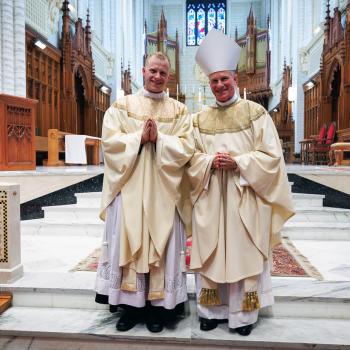One need not look very far to find stories in the news about violence among religious groups. There is a widespread assumption that religion breeds violence, that belonging to one religious group means by definition that one is against all others. In recent weeks, for example, we've seen the assassination of Shahbaz Bhatti, a Catholic who served as Minorities Minister in Pakistan and who lobbied for reform of that country's blasphemy laws. We've seen attacks on Muslims in the Ivory Coast. And on and on.
Our communications-saturated age is characterized by a "if it bleeds, it leads" mentality. Violence among people of different religious groups is played up in headlines because it incites passions and sells newspapers. Yet there is a much quieter, and vastly more common story of friendship among people of different faiths. The exquisitely wrought film Of Gods and Men dares to tell one such story, and thus represents an important contribution to our thinking about faith traditions today. Unlike those who want to assert that religions are jockeying for adherents—like so many political groups competing for power—this film tells the story of men who give themselves totally to their Catholic faith, and yet who look upon the Muslims around them with great love and affection. And the Muslim villagers with whom the monks live and work similarly show great affection toward the monks, showing that friendship can grow even when faiths differ.
There are many ways in which the story of the murder of Trappist monks by the Armed Islamic Group (AIG) could have been twisted into a grotesque "clash of civilizations" polemic. The film carefully avoids this narrow theme. What is important, however, is that it demonstrates how both groups, Catholic and Muslim, are equally serious about living their faith fully. There is no pretense that interfaith friendship demands the watering down of religious practice. The monks are shown frequently at prayer. This is no surprise, since they follow the Rule of Saint Benedict, which prescribes gathering for prayer up to seven times each day and night. Yet in one scene, the abbot of the monastery, Dom Christian de Chergé, hears the adhan, the Muslim call to prayer recited five times each day. Both the Catholics and the Muslims in this film are flesh-and-blood, heart-and-soul human beings trying to live with passion and purpose in their religious practices, and who see each other as cooperators rather than competitors in that mission.
In dealing with the act of violence that made the story of the monks international news in 1996, the film's director, Xavier Beauvois, manages to show that politics, not religion, is to blame. The extremists kill both Muslims and Catholics; they are motivated by thirst for political power. And yet, in one disarming scene, they are shown to still be human. Dom Christian speaks at some length with one of the AIG leaders. He asks the armed man whether he knows the Quran, reciting a verse that his interlocutor finishes. And when the abbot tells the man that the monks are about to celebrate Christmas, the man apologizes for the interruption of their celebration. Even in this harsh situation, religion is not really what divides them.
The village and the monastery are portrayed as an island of sanity amidst a nation that is being plagued by political unrest. The irony is that this island is populated by people of different faiths who have, over the years, developed such a deep friendship that neither group can imagine living without the other. The monks, at first fearing for their lives, come to recognize that they have obligations to their friends in the village. And the villagers themselves express to the monks that they will be vulnerable without them. One can imagine that such a deep friendship was hard-won, having been carefully cultivated by both sides who looked past both national differences (French and Algerian) and religious ones.
Dom Christian wrote a testament two years before his death that describes what he saw unfolding around him. It is a remarkable document, both in its sobriety about his life as a witness to Christian faith and in its generosity toward the Muslims with whom he lived and worked. I will excerpt it at some length below, but I encourage you to read the whole thing (it's about a page and a half).
I do not see, in fact, how I could rejoice
if the people I love were indiscriminately accused of my murder.
. . .
This is what I shall be able to do, God willing:
immerse my gaze in that of the Father
to contemplate with him His children of Islam
just as He sees them, all shining with the glory of Christ,
the fruit of His Passion, filled with the Gift of the Spirit
whose secret joy will always be to establish communion
and restore the likeness, playing with the differences.
The film, like the story that it portrays, offers a hopeful glimpse at the future of religious faith in our age. Religious faith—by which I mean not some vague sense of being spiritual, but rather the ancient practices of religion that we inherit from the voices of the past—offers us the wisdom of how to grow in friendship. We need not fear those whose religious practice is different from our own. We should rather fear those who, looking at religion from an uninformed critical distance, fail to engage its deep wisdom.
3/28/2011 4:00:00 AM





